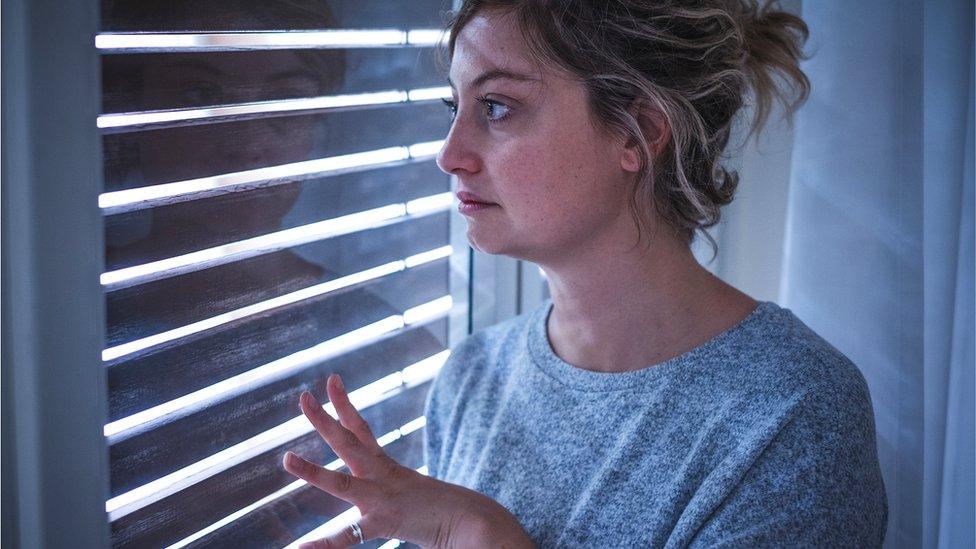'If I hadn't got out in lockdown I would be dead'
- Published

Lockdown made life even more difficult for women stuck in abusive relationships
The coronavirus lockdown added fuel to the fire of domestic abuse for many women in Scotland.
One woman has told the BBC if she hadn't escaped her abusive relationship in the lockdown months, she would have ended up dead.
Another woman's abusive partner was released from jail, making her a prisoner of fear in her own home.
The charity Women's Aid has revealed the devastating impact of Covid-19 on vulnerable families.
Davina, one of the women the charity has helped escape years of controlling abuse, said it was increased time at home with her abuser that made her seek help.

She told BBC Scotland's The Nine programme: "Lockdown was the worst time in my life. That was when I first paid attention to Women's Aid I wondered if they could get me out the situation, so took the number from the television.
"I wasn't allowed to use the phone in the house so I took the number and went out with the dog and I phoned it. I wasn't ready to go but they had nowhere for me anyway. But I was in constant contact with Rebecca from Women's Aid and she helped me eventually leave.
"If it hadn't been for them I don't know what would have happened. I think eventually I would be dead. Mentally, physically, emotionally - I couldn't do it any more."
Davina was allocated a place in a refuge and although she says it took her a month to stop waking up in the night crying, she finally feels safe.
It took longer than it should have to find Davina emergency accommodation, due to pandemic-related safety measures.
Local authorities and housing associations stopped allocating new accommodation during lockdown, meaning women in refuges were often unable to move into their own homes, in turn blocking refuge spaces for new women and children who needed them.

Carrie fled an abusive relationship but it all came back when her former partner got out of jail during lockdown
Problems also arose with child contact and access to justice. The existing system was unable to effectively respond to abusers using the pandemic as an excuse not to return children.
The closure of child contact centres has meant that handovers for child contact have become increasingly dangerous.
Changes to the criminal justice system, such as the increased use of undertakings and bail, have resulted in greater risks to women whose abusers would ordinarily have been remanded in custody.
Carrie's former partner was released from jail during lockdown.
She said: "Lockdown was a nightmare. The first thing he did was find me and terrorise me. I was in the house, working, juggling my kids. He was harassing me, threatening to kill himself and constantly phoning me, threatening to kick the door in.
"I couldn't sleep at night. In the past, neighbours saw him listening outside the window in the middle of the night. He had been in my garden watching. I was terrified as soon as he was released."
Carrie was abused from when her daughter was born.
"It was on and off after I had her because he kept attacking me. I did get back with him and he moved back in, he continued to bully money out of me, attack me," she said.
"He kept knives under his pillow , waking me up in the night to ask me who I was cheating with. He'd dream I had cheated on him and get me out of bed to batter me."

Getting away from abuse at home was difficult during lockdown
She added: "He tipped me out of bed and cut up the base of my bed, because he believed there was a man living in it.
"As soon as he got released it all started again."
Carrie had distanced herself from her former partner, but years of control and abuse came flooding back.
She said: "I told the police some of it. There was a lot of threatening behaviour so I didn't report all of it. I had a massive fear that if I reported it all social work would take my children away.
"I had to contact Women's Aid again during lockdown because it all just started again and knocked me backwards 10 steps."
She also said getting away and even meeting a friend for support became impossible due to lockdown restrictions.
'Difficult and dangerous'
Scottish Women's Aid has made a number of recommendations in its report to address the impacts of the pandemic, including an urgent review of specialist refuge accommodation to ensure sufficient provision, action by schools to support children with experience of domestic abuse and the use of virtual courts to reduce waiting times.
Despite an early injection of cash from the Scottish government, inconsistent applications of guidance by different local authorities caused "immense" challenges for groups in obtaining key worker status, PPE, and accessing school spaces for the children of the all-female workforce.
Dr Marsha Scott, chief executive of Scottish Women's Aid, said for women, children and young people experiencing domestic abuse, lockdown has been difficult and dangerous.
She said: "As lockdown and other measures ease, we are expecting a substantial increase in demand for services. Urgent action is required to remedy the problems we've set out in this new report and better planning is also needed so that, if lockdown measures continue to be required going forwards, previous problems affecting domestic abuse service providers and survivors will not be repeated."
- Published19 April 2020
